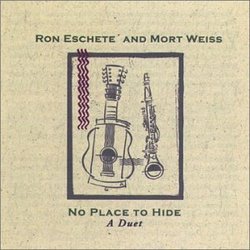| All Artists: Ron Eschete, Mort Weiss Title: No Place to Hide Members Wishing: 0 Total Copies: 0 Label: Sms Jazz Original Release Date: 3/15/2002 Release Date: 3/15/2002 Genres: Jazz, Pop Style: Number of Discs: 2 SwapaCD Credits: 2 UPC: 783707513225 |
Search - Ron Eschete, Mort Weiss :: No Place to Hide
 | Ron Eschete, Mort Weiss No Place to Hide Genres: Jazz, Pop
|
Larger Image |
CD Details |
CD ReviewsStimulating Nudist Camp Samuel Chell | Kenosha,, WI United States | 12/29/2006 (4 out of 5 stars) "The session could hardly be more aptly named, especially for the all-purpose guitarist Ron Eschete who, through the course of the two-disc duo session, can't afford to miss a single beat. Moreover, not only does the minimal instrumentation permit him to reveal the influence of guitarists like Jim Hall and Wes Montgomery but of seminal bass players like Ray Brown and Paul Chambers as well.
For example, on the Charlie Parker blues "Now's The Time," Eschete lays down a walking-bass foundation that would in itself be capable of holding the listener's attention. On the ensuing standard, "You're My Everything," the 4/4 bass line remains implied throughout, inviting not just Mort Weiss but the listener, in effect, to apply lessons learned from the preceding tune, mentally supplying the absent bass notes. Lest the challenge be too much, on "Out Of Nowhere" the guitarist reverts to playing bass lines, providing both variety and reinforcement of what the listener has learned. Clarinetist Weiss is encouraged by this spare, resourceful accompaniment to explore his instrument's expressive capabilities, including all of the nuances, subtle inflections, and varied vibratos that might be missed in a larger ensemble. The clarinet can be such a flag-waver, bringing the most reserved crowds to their feet, that it can be more than a little tempting to milk and bend a high note, using the instrument like a magic wand to elicit and control a crowd's responses--as predictably as Leonard Bernstein's baton or a theremin player's wave of the hand. The minimal instrumentation, however, discourages Weiss from resorting to such devices (even though he once played tenor saxophone in commercial R&B bands), and instead directs his undivided attention to playing the horn, not the audience. He covers the entire range of the instrument handily, but more often than not it's in the middle register where his ideas are most compelling, his tone most alluring. If alto saxophonist Paul Desmond's sound is, as many listeners have described it, like a dry martini, Weiss's is a smooth cognac, with enough strong flavor to linger but without any after-bite or burn. One time through on a melody like "Here's That Rainy Day" is no mere "in" chorus as played by Weiss but a richly satisfying performance that in itself comprises a complete whole. This organic quality extends to the medleys, with Eschete's storytelling on "My Buddy" intiating a continuous narrative for which Weiss' "Someday My Prince Will Come" provides a consonant concluding chapter. In many respects, "No Place To Hide" is as original, satisfying and unique as Weiss' and Eschete's later meetings with Joey DeFrancesco's B3 and company. Nowhere else are both players given as much individual solo or communicative conversation time as on a musical dialog which recalls a meeting of minds no less engaging than Bill Evans' and Jim Hall's revered "Undercurrent."" |

 Track Listings (19) - Disc #1
Track Listings (19) - Disc #1